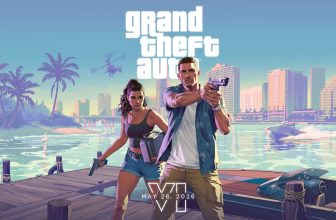Dispatch doesn’t have a secret identity – this is an episodic adventure that knows exactly what it wants to be. This superhero narrative comes from Telltale alumni (the studio that made The Walking Dead, The Wolf Among Us, and others), but don’t think it’s the same spray-painted structure. Incredibly focused, each episode is about 45 minutes or so, and delicious social dynamics and villainous conspiracy gets under your skin in a way that makes binging it almost impossible to resist – just like the best Netflix shows.
I wanted Dispatch to last forever while simultaneously feeling incapable of not hitting ‘next episode’ at the credits. Playing it all in one go with the final episode released meant no painful waits, breaking it up across a weekend being about the best I could do. Released in two episode chunks across four weeks, this is an incredibly smart model that avoids the wonky, long gaps that made it all too easy to bounce off of games like Life is Strange back in the day. Short episode length means Dispatch’s story moves at an incredible clip. But it’s not one I’ll be forgetting any time soon.
Dial H for hero

Fast facts
Release date: October 22 – November 12, 2025
Platform(s): PC, PS5
Developer: AdHoc Studio, Critical Role
Publisher: AdHoc Studio
Playing as the extremely comic book named Robert Robertson, your life has hit a roadbump. Career stalled, and very much hurting for money, you’re offered a stable income. All you have to do is join the SDN (Superhero Dispatch Network) as a dispatcher, a ‘man in the chair’ co-ordinator of a superhero team in a world where corporatized superheroes loom large – juggling tasks like saving cats from trees with the daily threat of supervillain gang leaders.
The catch? You’re the last ditch effort to get Z-team into shape, a group of misfits drafted in as part of the Phoenix Program – supervillains who want to reform into superheroes. Nobody exemplifies that better than the first member you meet, Invisigal – who can disappear for the length of her (asthmatic) lung capacity – who has just been rebranded from Invisibitch. A motley crew sporting strange powers, ranging from a crypto-scammer bat in a suit who transforms into a beast periodically, to the fiery and only partially fire-proof Flambee – their difficulty working as a team is the only start of their many, many problems.
Despite the mature tone and high age rating, Dispatch is far from cynical. Tongue-in-cheek corporate riffs abound, but the jokes are more Ratchet & Clank than they are The Boys or Invincible. There’s plenty of nudity (which can be toggled off) and foul mouthed humor too, but almost always as part of a joke – a toxic supervillain, for instance, always melts his clothes when powered up, so his poisonous cucumber is always on show. Dispatch also features one of the funniest farting on the toilet jokes I’ve ever seen.

Humor palette wise, Dispatch skews closest to The Venture Bros with its ridiculous world of supervillain bars and the like – but throughout it all I love the hopeful tone that permeates. At least, that’s the case with the narrative choices I make. A handful of bleaker choices seem to pass by my periphery, but if Dispatch’s choice breakdowns mid credits are anything to go by, this skews towards a feel-good story.
Each hero is extremely well-realized, with some terrific voice acting. A smorgasbord of talent, stars like Aaron Paul and Jeffery Wright are fantastic, and plenty of veteran voice acting talent. Many of them are part of Critical Role, the voice actor led live action roleplay group who have been crucial for Dispatch’s development, having joined with AdHoc as core collaborators. It does result in an odd mix, hearing Hollywood actors alongside some additional musical and YouTuber, the latter of which can be very hit and miss, but each role is mostly well-suited. Streamer Seán ‘Jacksepticeye’ McLoughlin is surprisingly brilliant as the energetic tiny penis-pummeler Punch-Up, and though Yung Gravy’s turn as animated mud mound Golem does just sound like the rapper’s usual incredibly deep voice – it just works (that’s gravy, baby).

By the time I hit the credits of the final episode, even the characters I found annoying at first strike affection in my heart – and I can’t help but dive right into the artbooks and bonus comics that are part of the deluxe edition to get a bit more of them before I go. There are a handful of moments in Dispatch where I tense up, used to shows like The Boys having truly terrible things happen constantly – but Dispatch never takes that road, and I’m glad for it (and I love The Boys to be clear). Its tone is refreshing. More like this year’s Superman, hope is the “real punk rock”.
With that said, Dispatch’s world isn’t the most unique. There are riffs on most famous superpower sets and superhero archetypes are in here. Seemingly useless abilities are frequent gags (Waterboy can vomit water – and that’s mostly all he can do). This is hardly the first story to explore the idea of realistic corporatization of superheroes, nor the first to tackle reforming supervillains. But also, I’m going to gobble up those tropes. Every. Single. Time.
What is unique about Dispatch is that you don’t just see this group of misfits grow closer, learning to work together as they form a kind of found family. You’re the architect of it as a core and vital member of Z-team yourself as their dispatcher. Though there are a few fantastic battle scenes – the whole of Dispatch is gorgeously animated with incredible shot composition – the focus is on navigating social situations.

Dispatch isn’t a freeform RPG – it’s telling a specific story that it allows you a degree of authorship over.
Part of the reason Dispatch is so snappy is that there’s no Telltale-style adventure game sections where you walk around. You won’t be poking around a supervillain bar to examine its peanuts – this is more like Goodbye Volcano High or We Are OFK where you move through dynamic scenes, much closer to an animated TV series. There are action-based QTEs, but these are surprisingly limited and feel largely inconsequential. In a suite of accessibility options the ability to turn these off is frontloaded at game start. At times, these add a fun layer of interaction – holding a trigger and pulling up to zip up a suit, or tapping a face button to mimic the launching of missiles, but they’re lightweight. Leaning on click and drag interactions feels a little odd playing on console, as it’s unusual for a story-heavy game like this to feel built around mouse and keyboard rather than console, but it’s not really a problem.
Mostly, you pick what you want Robert to say to people, and how you want him to react. These range from low-stakes, like what to quip before a bar fight breaks out, to less frequent choices that have huge ramifications for which characters you grow close to. As ever with a game this luxuriously presented, there aren’t a lot of big diversion points and it’s easy to see the seams of how these are put together when you look. Dispatch isn’t a freeform RPG – it’s telling a specific story that it allows you a degree of authorship over, and I think sticking to those guns really helps it feel cohesive. If you’re looking for something more spiralling, check out text adventures like Hunter: The Reckoning – The Beast of Glenkildove, or Vampire: The Masquerade – Night Road.
All punch bulletin

Hack job

Hacking is another core mini-game. Sometimes fun, more often than not it’s kind of annoying. My tip is to turn on unlimited retries and power through as soon as it overstays its welcome.
Brilliant animation, smart writing, and terrific characters would make Dispatch a fantastic episodic adventure in its own right. But the dispatching itself also forms a marvelous part of the package, edging the game into true game design genius. Dispatching is no mere story gimmick, but part of the game you actually play.
Presented with a computer view, you have to match heroes to jobs as they come in. Each hero has their own star graph set of stats to show their strengths and weaknesses, and you need to intuit the skill checks based on each job’s bullet point descriptions. Sometimes you can send multiple heroes at once, either to cover more bases or boost their stats – raiding a gang hideout for instance might mean sending heroes with good attack and durability is a must; defusing a bomb sounds like a job for your brainier squad members; while the odd press appearance will require a charmer.

Finishing jobs gives experience, meaning you can further customize each hero’s specialities. Some jobs will even have unique options suited to the powers of specific heroes, allowing you to clear them instantly. Heroes have unique abilities you only learn through play too. The light-powered pop star Prism, for instance, can duplicate a debuffed version of the hero to her left when in a job with three or more slots. Flambee, on the other hand, is ‘on fire’ when he completes a job, getting a bonus to the next one – but then may burn out after his chain fails.
Completion is based on how much your final star graph matches the star graph of the job – with a satisfying bouncing ball landing on screen for those that don’t match 100%. It almost feels as good as seeing a dice roll in a tabletop RPG. The only downside is the sticky interface can feel a bit inelegant on a controller, which can be annoying under time pressure, and it’s here I hit a few bugs. Nothing major, but, again, feels more designed for PC.

In fact, the dispatching is so solid it could stand as a moreish management game on its own. Drop a Dispatch Infinite and just let me tackle this thing daily, and I would be happy enough. But Dispatch goes even further. Every episode, the dispatching itself ties into the main narrative. Certain heroes may begin debuffed thanks to bad morale from a decision you made earlier. A hero under pressure may end up just refusing to let you add them to certain jobs. At one point a hero bounces after an argument – the dispatching ramps up the pressure on the calls for hero work with lots of available slots, all emphasizing the feeling of being spread thin. It’s a perfect balance between mechanics and storytelling, and utterly fantastic.
Everything in Dispatch comes together, and just like the perfect comic book mini-series I simply could not stop turning the page to see what happened next. In that sense, the game does have a few different identities, but there’s no ol’ Parker luck here – Dispatch juggles them all effortlessly to create one of the best superhero stories in the medium. This is one omnibus you need on your shelf.
Dispatch was reviewed on PS5, with code provided by the publisher.
Yearning to binge something else? Check out our best videogame stories list to find your next obsession.







